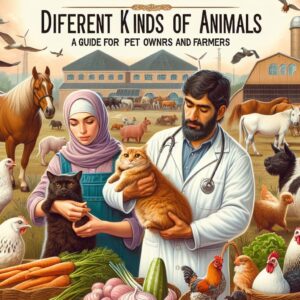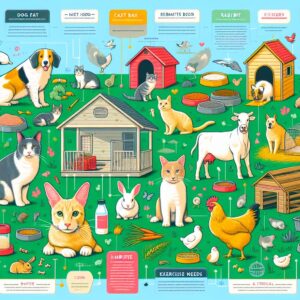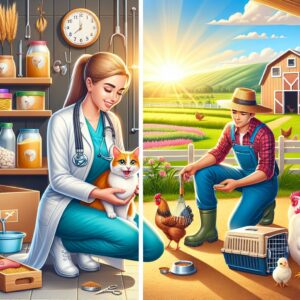As responsible pet owners and farmers, it is our duty to ensure the well-being and welfare of the animals under our care. Whether you share your home with a beloved pet or raise livestock on a farm, understanding the basics of animal care is essential. In this article, we will discuss valuable insights on caring for different kinds of animals, covering pet care, livestock management, and even tips for aiding injured animals in the wild.
Introduction
Caring for animals goes beyond providing food and shelter. It involves creating an environment that promotes their physical and mental health, ensuring they receive adequate veterinary care, and treating them with compassion and respect. This applies to both domesticated pets and farm animals, who depend on us for their vital needs.
Pet Care
Pets bring joy, companionship, and unconditional love into our lives. To ensure their well-being, it is crucial to be aware of their unique requirements. Here are some key considerations for pet owners:
Proper Nutrition
Providing a balanced diet tailored to your pet’s specific breed, age, and size is essential for their overall health. Consult with a veterinarian to determine the best food and feeding schedule for your furry friend. Additionally, always provide access to fresh water and monitor their portion sizes to maintain a healthy weight.
Exercise and Mental Stimulation
Regular exercise is crucial for pets to maintain proper physical health and mental well-being. Engage in activities that match their energy levels and offer mental stimulation, such as interactive toys, puzzle feeders, and playtime with other animals or family members.
Veterinary Care
Regular veterinary check-ups are an integral part of caring for your pet. Vaccinations, parasite prevention, dental care, and spaying/neutering are among the important aspects evaluated during these visits. Additionally, pay attention to any change in behavior, appetite, or other signs that may indicate health concerns, and seek prompt veterinary attention as needed.
Livestock Management
For farmers, the health and welfare of livestock animals are vital. Proper management significantly contributes to their productivity and, ultimately, the success of the farming operation. Consider the following aspects when caring for your herd or flock:
Housing and Shelter
Providing comfortable and appropriate housing is crucial to ensure the well-being of livestock animals. Structures should protect them from extreme weather conditions, allow proper ventilation, and provide ample space for each animal. It is essential to keep the barn or pen clean, minimizing the risk of diseases and promoting good hygiene.
Nutrition and Feeding
Maintaining a balanced and nutrient-rich diet is crucial for the health and productivity of livestock. Depending on the species and purpose, a variety of feeds may be required, including grass, hay, silage, grains, or specialized feeds. Seek advice from a veterinarian or an animal nutritionist to develop an appropriate feeding plan based on the specific needs of your livestock animals.
Disease Prevention and Veterinary Care
Regular veterinary visits for livestock animals are essential to prevent and diagnose diseases, manage vaccination schedules, and ensure proper healthcare. Additionally, practicing biosecurity measures, such as quarantining new animals and implementing strict hygiene protocols, helps reduce the risk of introducing infectious diseases into the herd or flock.
Caring for Injured Animals in the Wild
While caring for our own animals is paramount, it is also our duty to help injured animals we encounter in the wild. Here are some guidelines to keep in mind:
Observe from a Distance
Approach injured animals cautiously, as they may be frightened or aggressive due to pain or fear. Maintain a safe distance and try to calm them by speaking softly. Remember to never compromise your own safety when attempting to help an injured animal.
Contact Wildlife Rehabilitation Centers
If you encounter an injured wild animal and it is safe to do so, contact your local wildlife rehabilitation center. They have the expertise and facilities to safely care for and rehabilitate the animal, increasing its chances of survival and successful release back into the wild.
Conclusion
Caring for different kinds of animals requires knowledge, compassion, and a commitment to their well-being. Whether you own a pet or manage a farm, prioritizing proper nutrition, veterinary care, and providing suitable living conditions are essential. Additionally, promoting responsible behavior towards injured animals in the wild ensures we contribute positively to their rehabilitation and eventual release. By incorporating these principles into our lives, we become better caretakers, fostering a healthier and more compassionate world for all creatures.



